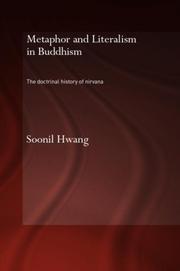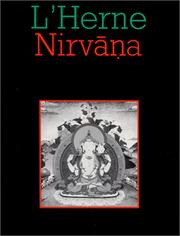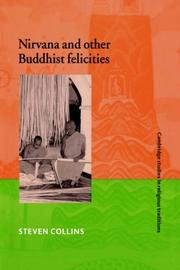| Listing 1 - 10 of 14 | << page >> |
Sort by
|
Book
ISBN: 1685710352 Year: 2022 Publisher: Goleta, California : Punctum Books,
Abstract | Keywords | Export | Availability | Bookmark
 Loading...
Loading...Choose an application
- Reference Manager
- EndNote
- RefWorks (Direct export to RefWorks)
In the early twentieth century, Uchiyama Gudō, Seno'o Girō, Lin Qiuwu, and others advocated a Buddhism that was radical in two respects. Firstly, they adopted a more or less naturalist stance with respect to Buddhist doctrine and related matters, rejecting karma or other supernatural beliefs. And secondly, they held political and economic views that were radically anti-hegemonic, anti-capitalist, and revolutionary. Taking the idea of such a "radical Buddhism" seriously, A Buddha Land in This World: Philosophy, Utopia, and Radical Buddhism asks whether it is possible to develop a philosophy that is simultaneously naturalist, anti-capitalist, Buddhist, and consistent. Rather than a study of radical Buddhism, then, this book is an attempt to radicalize it. The foundations of this "radicalized radical Buddhism" are provided by a realist interpretation of Yogācāra, elucidated and elaborated with some help from thinkers in the broader Tiantai/Tendai tradition and American philosophers Donald Davidson and W.V.O. Quine. A key implication of this foundation is that only this world and only this life are real, from which it follows that if Buddhism aims to alleviate suffering, it has to do so in this world and in this life. Twentieth-century radical Buddhists (as well as some engaged Buddhists) came to a similar conclusion, often expressed in their aim to realize "a Buddha land in this world. Building on this foundation, but also on Mahāyāna moral philosophy, this book argues for an ethics and social philosophy based on a definition of evil as that what is or should be expected to cause death or suffering. On that ground, capitalism should be rejected indeed, but utopianism must be treated with caution as well, which raises questions about what it means - from a radicalized radical Buddhist perspective - to aim for a Buddha land in this world.
Buddhism --- Doctrines. --- Philosophy. --- Buddhist doctrines --- Buddhist theology --- Lamaist doctrines

ISBN: 9780415346528 9780415600002 0415346525 0415600006 9786610217410 1134279418 1280217413 0203010574 9780203010570 9781134279364 9781134279401 9781134279418 113427940X Year: 2005 Publisher: London ; New York : RoutledgeCurzon,
Abstract | Keywords | Export | Availability | Bookmark
 Loading...
Loading...Choose an application
- Reference Manager
- EndNote
- RefWorks (Direct export to RefWorks)
David Webster explores the notion of desire as found in the Buddhist Pali Canon. Beginning by addressing the idea of a 'paradox of desire', whereby we must desire to end desire, the varieties of desire that are articulated in the Pali texts are examined. A range of views of desire, as found in Western thought, are presented as well as Hindu and Jain approaches. An exploration of the concept of ditthi(view or opinion) is also provided, exploring the way in which 'holding views' can be seen as analogous to the process of desiring. Other subjects investigated include the mind-body relati
Desire --- Buddhism --- Religious aspects --- Buddhism. --- Doctrines. --- Buddhist doctrines --- Buddhist theology --- Lamaist doctrines --- Desire - Religious aspects - Buddhism. --- Buddhism - Doctrines. --- thought --- pali --- ears --- view --- hindu --- position --- robert --- morrison --- rhys --- davids
Book
ISBN: 9783700167228 3700167229 Year: 2010 Volume: 66 394 Publisher: Wien : Verlag der Österreichischen Akademie der Wissenschaften,
Abstract | Keywords | Export | Availability | Bookmark
 Loading...
Loading...Choose an application
- Reference Manager
- EndNote
- RefWorks (Direct export to RefWorks)
Death --- Mort --- Religious aspects --- Buddhism. --- Aspect religieux --- Bouddhisme --- Buddhism --- Dying --- End of life --- Life --- Terminal care --- Terminally ill --- Thanatology --- Buddhist doctrines --- Buddhist theology --- Lamaist doctrines --- Doctrines --- Religious aspects&delete& --- Philosophy --- Death - Religious aspects - Buddhism
Book
ISBN: 9514107098 9789514107092 Year: 1993 Volume: 66 Publisher: Helsinki : Suomalainen tiedeakatemia = Academia scientiarum fennica,
Abstract | Keywords | Export | Availability | Bookmark
 Loading...
Loading...Choose an application
- Reference Manager
- EndNote
- RefWorks (Direct export to RefWorks)
Mysticism --- Buddhism --- Buddhism. --- Doctrines. --- -Buddhism --- -Buddha and Buddhism --- Lamaism --- Ris-med (Lamaism) --- Religions --- Dark night of the soul --- Mystical theology --- Theology, Mystical --- Spiritual life --- Negative theology --- Doctrines --- Buddhist doctrines --- Buddhist theology --- Lamaist doctrines --- Mysticism - Buddhism. --- Buddhism - Doctrines. --- Bouddhisme --- Mysticisme

ISBN: 1134254350 1280549467 9786610549467 0203001931 1134254342 0415355508 0415650100 Year: 2006 Publisher: Taylor & Francis
Abstract | Keywords | Export | Availability | Bookmark
 Loading...
Loading...Choose an application
- Reference Manager
- EndNote
- RefWorks (Direct export to RefWorks)
Soonil Hwang studies the doctrinal development of nirvana in the Pali Nikaaya and subsequent tradition and compares it with the Chinese aagama and its traditional interpretation. He clarifies early doctrinal developments of Nirvana and traces the word and related terms back to their original metaphorical contexts, elucidating diverse interpretations and doctrinal and philosophical developments in the abhidharma exegeses and treatises of Southern and Northern Buddhist schools. The book finally examines which school, if any, kept the original meaning and re
Nirvana. --- Agama. --- Utopias --- Buddhism --- Religious aspects --- Buddhism. --- Doctrines. --- Buddhist doctrines --- Buddhist theology --- Lamaist doctrines --- Ideal states --- States, Ideal --- Utopian literature --- Political science --- Socialism --- Voyages, Imaginary --- Dystopias --- Agamidae --- Eightfold Path --- Eschatology --- early --- canon --- nirvana --- theory --- metaphorical --- structure --- elements --- louis --- delas --- buddhist
Book
ISBN: 9781107477100 9781107062399 9781107695382 1107477107 9781139923095 1139923099 9781139911351 113991135X 9781139907507 1139907506 110706239X 1107695384 1139905570 1139915290 1139899716 1322066248 1139903608 1139919210 Year: 2014 Publisher: New York
Abstract | Keywords | Export | Availability | Bookmark
 Loading...
Loading...Choose an application
- Reference Manager
- EndNote
- RefWorks (Direct export to RefWorks)
A cornerstone of Buddhist philosophy, the doctrine of the four noble truths maintains that life is replete with suffering, desire is the cause of suffering, nirvana is the end of suffering, and the way to nirvana is the eightfold noble path. Although the attribution of this seminal doctrine to the historical Buddha is ubiquitous, Rethinking the Buddha demonstrates through a careful examination of early Buddhist texts that he did not envision them in this way. Shulman traces the development of what we now call the four noble truths, which in fact originated as observations to be cultivated during deep meditation. The early texts reveal that other central Buddhist doctrines, such as dependent-origination and selflessness, similarly derived from meditative observations. This book challenges the conventional view that the Buddha's teachings represent universal themes of human existence, allowing for a fresh, compelling explanation of the Buddhist theory of liberation.
Meditation --- Buddhist philosophy. --- Buddhism --- Buddhist doctrines --- Buddhist theology --- Lamaist doctrines --- Philosophy, Buddhist --- Philosophy --- Buddhism and philosophy --- Dhyāna (Meditation) --- Meditation (Buddhism) --- Meditation (Lamaism) --- Buddhism. --- Doctrines. --- Tantric Buddhism --- Zen Buddhism
Book
ISBN: 1009106333 1009098837 1009116436 1009116231 Year: 2022 Publisher: Cambridge : Cambridge University Press,
Abstract | Keywords | Export | Availability | Bookmark
 Loading...
Loading...Choose an application
- Reference Manager
- EndNote
- RefWorks (Direct export to RefWorks)
Western Buddhist travel narratives are autobiographical accounts of a journey to a Buddhist culture. Dozens of such narratives have since the 1970s describe treks in Tibet, periods of residence in a Zen monastery, pilgrimages to Buddhist sites and teachers, and other Asian odysseys. The best known of these works is Peter Matthiessen's The Snow Leopard; further reflections emerge from thirty writers including John Blofeld, Jan Van de Wetering, Thomas Merton, Oliver Statler, Robert Thurman, Gretel Ehrlich, and Bill Porter. The Buddhist concept of 'no-self' helps these authors interpret certain pivotal experiences of 'unselfing' and is also a catalyst that provokes and enables such events. The writers' spiritual memoirs describe how their journeys brought about a new understanding of Buddhist enlightenment and so transformed their lives. Showing how travel can elicit self-transformation, this book is a compelling exploration of the journeys and religious changes of both individuals and Buddhism itself.
Spiritual life --- Sunyata. --- Buddhism --- Buddhism. --- Doctrines. --- Buddhist doctrines --- Buddhist theology --- Lamaist doctrines --- Buddhist philosophy --- Mādhyamika (Buddhism) --- Truth --- Emptiness (Sunyata) --- Nothingness (Sunyata) --- Relativity (Sunyata) --- Suññatā --- Void (Sunyata) --- Spiritual life (Buddhism) --- Spiritual life (Lamaism) --- Doctrines --- Religious aspects

ISBN: 2851970747 9782851970749 Year: 1993 Volume: 63 Publisher: Paris : Editions de l'Herne,
Abstract | Keywords | Export | Availability | Bookmark
 Loading...
Loading...Choose an application
- Reference Manager
- EndNote
- RefWorks (Direct export to RefWorks)
Indo-European literature --- Indian religions --- Indic languages --- Buddhism --- Nirvana --- Bouddhisme --- Doctrines --- Hinduism --- Philosophy, Indic. --- Nirvana. --- Doctrines. --- -Hinduism --- -Nirvana --- Philosophy, Indic --- Indic philosophy --- Philosophy, East Indian --- Hindu philosophy --- Eightfold Path --- Eschatology --- Religions --- Brahmanism --- Buddha and Buddhism --- Lamaism --- Ris-med (Lamaism) --- Doctriens --- Buddhist doctrines --- Buddhist theology --- Lamaist doctrines --- Buddhism - Doctrines. --- Hinduism - Doctrines. --- Spiritualite orientale
Book
ISBN: 9780521708340 0521708346 9780521881982 0521881986 9780511812118 9780511677625 0511677626 9780511682100 0511682107 0511812116 0511684088 9780511684081 1107211123 1282538985 9786612538988 0511678878 0511680120 9781107211124 9781282538986 6612538988 9780511678875 9780511680120 Year: 2010 Publisher: Cambridge, UK ; New York : Cambridge University Press,
Abstract | Keywords | Export | Availability | Bookmark
 Loading...
Loading...Choose an application
- Reference Manager
- EndNote
- RefWorks (Direct export to RefWorks)
The idea of nirvana (Pali nibbāna) is alluring but elusive for non-specialists and specialists alike. Offering his own interpretation of key texts, Steven Collins explains the idea in a new, accessible way - as a concept, as an image (metaphor), and as an element in the process of narrating both linear and cyclical time. Exploring nirvana from literary and philosophical perspectives, he argues that it has a specific role: to provide 'the sense of an ending' in both the systematic and the narrative thought of the Pali imaginaire. Translations from a number of texts, including some dealing with past and future Buddhas, enable the reader to access source material directly. This book will be essential reading for students of Buddhism, but will also have much to teach anyone concerned with Asia and its religions, or indeed anyone with an interest in the ideas of eternal life or timelessness.
Nirvana. --- Buddhism --- Doctrines. --- Nirvana --- 294.3 --- 294.3 Boeddhisme--(algemeen) --- 294.3 Boeddhisme:--verder in te delen zoals 291.1/.8 --- Boeddhisme--(algemeen) --- Boeddhisme:--verder in te delen zoals 291.1/.8 --- Buddhist doctrines --- Buddhist theology --- Lamaist doctrines --- Eightfold Path --- Eschatology --- Doctrines --- Utopias --- Religious aspects --- Buddhism. --- Arts and Humanities --- Religion --- Bouddhisme

ISBN: 0521570549 0521578426 0511520654 9780521570541 9780511520655 9780521578424 Year: 1998 Volume: 12 Publisher: Cambridge Cambridge University Press
Abstract | Keywords | Export | Availability | Bookmark
 Loading...
Loading...Choose an application
- Reference Manager
- EndNote
- RefWorks (Direct export to RefWorks)
This book presents an answer to the question: what is nirvana? Part I distinguishes between systematic and narrative thought in the Pali texts of Theravada Buddhism in South and Southeast Asia, arguing that nirvana produces closure in both, and setting nirvana in the wider category of Buddhist Felicities. Part II explores other Buddhist utopias (both eu-topias, 'good places', and ou-topias, 'no-places'), and relates Buddhist utopianism to studies of European and American utopian writing. The book ends with a close reading of the Vessantara Jataka, which highlights the conflict between the ascetic quest for closure and ultimate felicity, and the ongoing demands of ordinary life and society. Steven Collins discusses these issues in relation to textuality, world history and ideology in premodern civilizations, aiming to contribute to an alternate vision of Buddhist history, which can hold both the inside and the outside of texts together.
Nirvana --- Utopias --- -Buddhism --- -Buddha and Buddhism --- Lamaism --- Ris-med (Lamaism) --- Religions --- Ideal states --- States, Ideal --- Utopian literature --- Political science --- Socialism --- Voyages, Imaginary --- Dystopias --- Eightfold Path --- Eschatology --- Religious aspects --- Doctrines --- Nirvana. --- Buddhism --- Doctrines. --- Buddhism. --- Utopies --- Bouddhisme --- Aspect religieux --- Buddhist doctrines --- Buddhist theology --- Lamaist doctrines --- Religious aspects&delete& --- Arts and Humanities --- Religion --- Utopias - Religious aspects - Buddhism --- Buddhism - Doctrines
| Listing 1 - 10 of 14 | << page >> |
Sort by
|

 Search
Search Feedback
Feedback About UniCat
About UniCat  Help
Help News
News